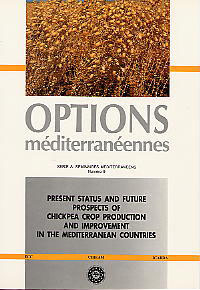| Article précédent | p. 101-106 | Article suivant |
Chickpea and its root-nodule bacteria: implications of their relationships for legume inoculation and biological nitrogen fixation
Chickpeas are able to utilize atmospheric nitrogen derived from the symbiotic relationship formed with root nodule bacteria. This association is highly specific in chickpea, with a unique group of rhizobia necessary for formation of nodules and nitrogen fixation. Nodulation problems attributed to the rhizobial symbiot may be due to absence of appropiate strains, low population numbers, low infectiveness, poor survival in soil, or competition amongst strains of rhizobia. Legume inoculation is a way of assuring that the strain of Rhizobium appropriate for the cultivar being planted is present at the proper time in numbers sufficient to assure effective nodulation and nitrogen fixation. Inoculation trials in the region indicate yield response of cultivars to application of appropriate rhizobial strains, but the importance of adequate strain testing prior to an inoculation effort is emphasized.
- [ Afficher ]
- [ Télécharger ]
- [ Exporter la citation ]
Vous pouvez télécharger la citation au format :
- [ Imprimer ]
-
Mots-clés
CICER ARIETINUM, FIXATION DE L'AZOTE, RHIZOBIUMCiter cet article
Cleyet-Marel J.C., Di Bonito R., Beck D. Chickpea and its root-nodule bacteria: implications of their relationships for legume inoculation and biological nitrogen fixation. In : Saxena M.C. (ed.), Cubero J.I. (ed.), Wery J. (ed.). Present status and future prospects of chickpea crop production and improvement in the Mediterranean countries. Zaragoza : CIHEAM, 1990. p. 101-106. (Options Méditerranéennes : Série A. Séminaires Méditerranéens; n. 9). Present Status and Future Prospects of Chickpea Crop Production and Improvement in the Mediterranean Countries, 11-13 Jul 1988, Zaragoza (Spain). http://om.ciheam.org/om/pdf/a09/91605016.pdf



